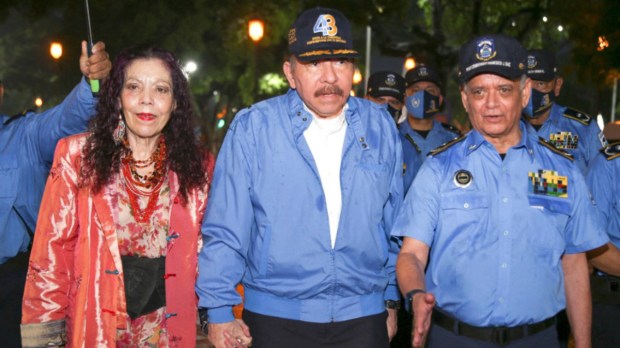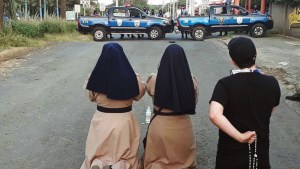The silencing of dissenting voices in Nicaragua directly targets the Catholic Church yet again. In the last five years, the Catholic Church in Nicaragua has gone through more than 190 attacks and desecrations, including a fire in the Managua Cathedral, the expulsion of the Missionaries of Charity, the imprisonment of Bishop Rolando Álvarez, and the exile and stripping of the citizenship of more than 222 former political prisoners, priests, bishops, and seminarians included.
Now, according to Vatican News, Ortega’s dictatorship has “reportedly banned the traditional public processions of the Way of the Cross in all parishes in the country.” Lenten and Easter rites will have to take place inside churches.
Tensions between the Sandinista regime and the Catholic Church in Nicaragua “reached its peak last week when, in a speech for the 89th anniversary of the killing of Nicaraguan national hero Augusto Sandino, President Ortega launched an unprecedented attack against the Church,” Vatican News explains.
Ortega’s accusations
In his address to the nation, Ortega accused the Catholic hierarchy of the Church in Nicaragua of “grave crimes and horrors,” and of supporting Somoza, the former Nicaraguan dictator who was ousted by the Sandinista Revolution, back in 1979.
He also accused the papacy of having supported Mussolini, and said the Vatican was a “mafia-like organization.”
However, this is far from being the first time Ortega attacks the Catholic Church in Nicaraguain a public speech.
Last September, in a vitriolic address marking the 43rd anniversary of the National Police, Ortega referred to the Catholic Church as “the perfect dictatorship”: “Who elected the bishops, the pope, the cardinals? […] With what moral authority do they speak of democracy? […] Everything [in the church] is imposed. It’s a dictatorship, the perfect dictatorship. It’s a tyranny, the perfect tyranny.”
He also accused Catholic leaders of being a “gang of murderers,” claiming that the hierarchy of the Church in Nicaragua called on protesters to kill him during 2018 demonstration, and scorned Pope Francis’ call for dialogue in the country.
Silencing the opposition
Ortega (who considers himself a Catholic) won the elections in 2021 after disqualifying and imprisoning opposition candidates. Since then, his regime has persecuted priests and bishops standing for the defense of human rights, the church in Nicaragua, and democratic institutions.
Pope Francis has said he is convinced that dialogue can establish a basis for co-existence. After leading the faithful in the midday Angelus in Rome last August 21, 2022, Pope Francis said: “I am following closely, with concern and sorrow, the situation created in Nicaragua that involves persons and institutions. I would like to express my conviction and my hope that, through an open and sincere dialogue, the basis for a respectful and peaceful co-existence might still be found.”
Pope supports bishop
Just a few weeks ago, on February 12, Pope Francis was open about his support for Bishop Alvarez.
After the midday Angelus this February 12, he said:
The news from Nicaragua has saddened me a great deal, and I cannot but remember with concern Bishop Rolando Álvarez of Matagalpa, whom I care about greatly, sentenced to 26 years imprisonment, and also those who have been deported to the United States.
He led the pilgrims in St. Peter’s in praying a Hail Mary for the nation.


